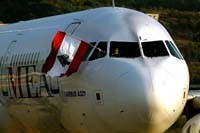 Israel decides to extend naval blockade another 48 hours. Beirut airport Welcomes first direct flights
Israel decides to extend naval blockade another 48 hours. Beirut airport Welcomes first direct flightsBy Rym Ghazal, Daily Star staff
BEIRUT: A much anticipated end to Israel's blockade of Lebanon fell short of expectations Thursday, with Israel announcing that it would continue its naval siege until international forces took up their maritime positions. Israel's last-minute decision to extend its naval blockade for another 48 hours came in response to a wave of domestic opposition from the military and families of two captured Israel soldiers to lifting the siege before the soldiers are returned. "The aerial blockade has been removed. In coordination with the United Nations, the naval blockade will continue until the international naval force is in place," Miri Eisen, a spokeswoman for Prime Minister Ehud Olmert, told reporters. According to Israeli public television, the Israeli Army is expected to completely withdraw its troops from Southern Lebanon by September 22, coinciding with the Jewish New Year. "What starts at 6 p.m. [1500 GMT] is a gradual process, it could take hours or a day [to complete]," she added, referring to the hour in which hundreds of thousands of Lebanese had expected to celebrate the liberation of their country's seas and skies. Israel said the UN was still working out logistical issues, but expected the problem to be resolved within 48 hours - bumping the expected lifting of the siege to 6 p.m. Saturday. However, Israel said earlier in the day it "reserved the right" to attack any suspected Hizbullah shipments from Syria. The announcement of the blockade's extension came mere minutes after Speaker Nabih Berri and dozens of MPs had packed up and left the Parliament, ending their six-day sit-in against the blockade. "Now we can say the war is officially over," Berri had told the Parliament in a speech held at precisely 6 p.m. "We withstood the Israeli aggression and we withstood the siege that was suffocating every aspect of our everyday life and was being used as blackmail against us to make us bow," the speaker said, praising Hizbullah, the people and the media for "their great sacrifices during and after the war." "We finally regained control of our ports that have been used by the Israelis to sneak into Lebanon," Berri added, moments before Israel announced it would continue to control Lebanon's seaways. "We can now begin the next stage; the reconstruction of the infrastructure and our souls. But we have to remain united, united and united, especially now, and rebuild Lebanon again with even better infrastructure and determination," he continued. When contacted by The Daily Star, a spokesperson for the speaker said: "The naval blockade is a technical problem, not political, and so the speaker and the MPs are not going to resume the sit-in."
As Lebanon's ports remained empty, with industrial cranes that had been brought out to greet incoming ships in Beirut sitting idle, life was once more breathed into Rafik Hariri International airport. A Middle East Airlines flight from coming from Paris circled over Beirut at low altitude four minutes after the air blockade was lifted, banking over Downtown Beirut three times before landing at the airport located just outside the capital in celebration. The Israeli Army lowered the blockade on the Beirut airport after bombing its runways and fuel-storage tanks on July 13, the day after Hizbullah fighters captured the two soldiers. Once the plane landed, a large Lebanese flag was thrust out of a cockpit window, the distinctive green cedar tree emblem flanked by two solid red bars waving in the wind. The MEA flight was soon followed by a Kuwait Airways plane loaded with officials from the Gulf country and commercial passengers. The Kuwaiti plane also hung a Lebanese flag out of a cockpit window after landing at Rafik Hariri International Airport. Airport officials said that most airlines were planning to resume their regular flights to Beirut on Friday.
No comments:
Post a Comment